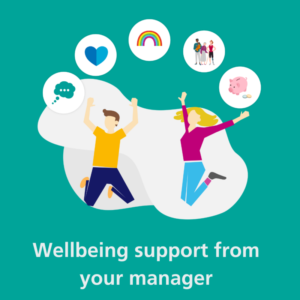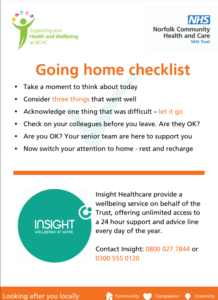What your manager can do to support you
What your manager can do to support you

Although self-care can make a big difference to protecting your mental health throughout winter (and other times of the year), please remember that you don’t have to go it alone.
Struggling with our mental wellbeing can impact how we perform at our job, so it is entirely appropriate to discuss how you’re feeling with your line manager. Your managers will be experienced in supporting the wellbeing of their team.
It is especially important to talk to your line manager if a situation at work or at home is creating a mental health challenge; making your manager aware may be the first step in tackling the problem. If you feel unable to talk to your manager, please reach out to one of our Mental Health First Aiders, or if the issues could affect patient safety a Freedom to Speak Champion.
As part of our World Mental Health Day blog series, here’s an overview of the ways your line manager can support your mental wellbeing at work…
The Staff Mental Health and Wellbeing Policy
This policy is available for all staff to access: search ‘Mental Health and Wellbeing Policy’ on the Intranet. This document outlines the trust’s commitments to protecting the mental health and wellbeing of all staff, as well as the expectations and responsibilities on managers. Your line manager will be able to use this policy to provide a framework of support for you.
Wellness Action Plans
Wellness Action Plans are documents we use at the trust to facilitate mental health conversations between you and your line manager. These are based on the principles of the Wellness Action Plans created by mental health organisation, Mind.
While you own the Wellness Action Plan and fill it in based on your own feelings and experiences, you will go through it with your manager and discuss your comments. This will help your line manager support you in the way that works best for you. To find our Wellness Action Plan search …….
The Going Home Checklist
After a busy day at work, it can be far too easy to carry the stresses from the day into your personal time. This can negatively affect the quality of your free time and make it much more difficult for you to relax and recharge outside work.
The Going Home Checklist is a simple resource created by the trust to help overcome this problem. It provides several suggestions to help you unwind at the end of your shift, so that your leisure time is not impacted by worries about work. For example:
- Take a moment to think about today
- Consider three things that went well
- Acknowledge one thing that was difficult – let it go
- Check on your colleagues before you leave. Are they OK?
- Are you OK? Your senior team are here to support you
- Now switch your attention to home – rest and recharge
These posters should be
displayed prominently on the main exits to your work area. If you think one’s missing, speak to your line manager.

Appraisals at NCH&C
Appraisals aren’t just a box-ticking exercise: it’s a protected time to celebrate achievements and set objectives. The appraisal document template we use at NCH&C also has a dedicated section which provides you the opportunity to discuss your general wellbeing with your manager. Appraisals are much more beneficial for both parties when you make time to prepare in advance, including thinking about any wellbeing concerns you’d like to discuss.
Protecting and supporting lone workers
As a community healthcare provider, many of our staff work in different locations across the county, sometimes on their own. Even if you manage your own caseload, it is your managers responsibility to know your whereabouts in order to keep you safe. For example, your team should have a protocol for starting and finishing the day safely, in line with the trust’s lone worker policy. If you have any concerns about working alone, please do speak to your manager or a Freedom to Speak Up Champion.
Managers also have a responsibility for ensuring that staff that frequently work alone (whether on-site, in the community, or from home) do not struggle with feelings of loneliness. If you feel like you lack social interaction with your colleagues, speak to your manager about setting time aside in team meetings for social catch ups. When we work alone, it can be easy to miss these ‘water cooler moments’ that allow us to bond with our co-workers, and ultimately work together better. This may be especially true to new or less experienced members of a team.
We’ll be publishing another World Mental Health Day blog tomorrow, focussing on what the trust can do to support you. Click here for more info about staff wellbeing at NCH&C.
